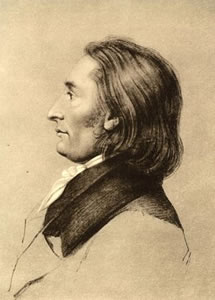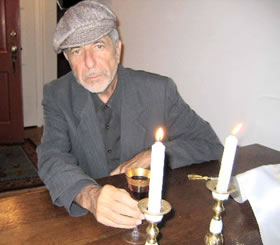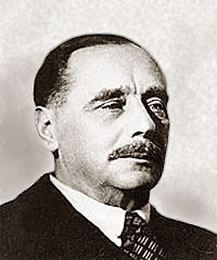De Duitse dichter Johann Peter Eckermann werd geboren op 21 september 1792 in Winsen (Luhe). Hij was bovenal de medewerker en vriend van Johann Wolfgang von Goethe. Eckermann is vooral bekend geworden door zijn opgetekende en uitgegeven gesprekken met Johann Wolfgang von Goethe. Hij publiceerde na de dood van dit Duitse genie negen jaar van gesprekken in boekvorm. Goethe wist van Eckermanns voornemen en stemde in met publicatie, onder de voorwaarde dat dit pas na zijn dood zou gebeuren. Het werk verscheen onder de titel Gespräche mit Goethe in den letzten Jahren seines Lebens.
An Goethe
Wenn im Rechten ich begriffen,
Hab ich’s einzig Dir zu danken.
Denn im Irren, Suchen, Schwanken,
Hat mich Deine Hand ergriffen
Und auf rechten Weg geleitet,
Der, geebnet, fest, gebreitet,
Nicht in Sümpfe sich verlieret,
Nein! zum sichern Ziele führet.
Goethe
Der Deutschen Licht! Wer kann sich Dir vergleichen!
Was einzeln glänzt, muß neben Dir erbleichen.
Der Deutschen Stolz! ihr Haß! ihr Ruhmverschlinger!
Was einzeln groß – wird neben Dir geringer.

Johann Peter Eckermann (21 september 1792 – 3 december 1854)
De Canadese dichter, folk singer-songwriter en schrijver Leonard Cohen werd geboren op 21 september 1934 te Montréal. Leonard Cohen werd geboren in een joodse middenklassefamilie in Montréal. Als tiener leerde hij gitaar spelen en formeerde een country/folkgroep genaamd the Buckskin Boys. Hij studeerde letteren aan de McGill University met als doel dichter te worden en debuteerde in 1956 met Let Us Compare Mythologie. Reeds in 1961 was hij in Canadese poëziekringen een bekende naam.In 1967 verhuisde Cohen naar de Verenigde Staten, waar hij een reputatie als singer-songwriter vestigde.
TO A FELLOW STUDENT
I thought about you a lot.
I still do.
You sat still,
your hands clasped on your lap
like a schoolchild.
You were allowed to cry
because you have been true
to your grief.
I saw you today
sitting in the same way,
the same tears on your cheeks,
as if you had not moved
in all these years –
the same bad headache
in your right eye,
the same housefly
trying to fertilize your lips.
Old friend, you’re a mess
by every measure
except the ladder of love.
THE ONLY POEM
This is the only poem
I can read
I am the only one
can write it
I didn’t kill myself
when things went wrong
I didn’t turn
to drugs or teaching
I tried to sleep
but when I couldn’t sleep
I learned to write
I learned to write
what might be read
on nights like this
by one like me

Leonard Cohen (Montréal, 21 september 1934)
De Britse schrijver Herbert George Wells werd geboren op 21 september 1866 Hij werd vooral bekend door zijn sciencefictionverhalen zoals The Invisible Man and The Time Machine. Zijn roman The War of the Worlds werd later beroemd door het hoorspel van Orson Welles dat ophef maakte in 1938. In 2005 verscheen van Steven Spielberg een spectaculaire rampenfilm gebaseerd op hetzelfde boek.
Uit: The War of the Worlds (hoofdstuk 1)
The Eve of the War
But who shall dwell in these worlds if they be inhabited?… Are we or they Lords of the World?… And how are all things made for man?–
Kepler (quoted in The Anatomy of Melancholy)
No one would have believed in the last years of the nineteenth century that this world was being watched keenly and closely by intelligences greater than man`s and yet as mortal as his own; that as men busied themselves about their various concerns they were scrutinised and studied, perhaps almost as narrowly as a man with a microscope might scrutinise the transient creatures that swarm and multiply in a drop of water. With infinite complacency men went to and fro over this globe about their little affairs, serene in their assurance of their empire over matter. It is possible that the infusoria under the microscope do the same. No one gave a thought to the older worlds of space as sources of human danger, or thought of them only to dismiss the idea of life upon them as impossible or improbable. It is curious to recall some of the mental habits of those departed days. At most terrestrial men fancied there might be other men upon Mars, perhaps inferior to themselves and ready to welcome a missionary enterprise. Yet across the gulf of space, minds that are to our minds as ours are to those of the beasts that perish, intellects vast and cool and unsympathetic, regarded this earth with envious eyes, and slowly and surely drew their plans against us. And early in the twentieth century came the great disillusionment.

H. G. Wells (21 september 1866 – 13 augustus 1946)
